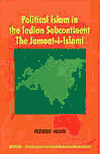| |
BOOK REVIEW
Anatomy
of Islamism
Political Islam in the Indian
Subcontinent. The Jamaat-i-Islami, by
Frederic Grare
Reviewed by Sreeram Chaulia
Al-Islam hua Al-Hal (Islam is the
solution to everything)
- Motto of the Jamaat-i-Islami, Pakistan
 In
merely 134 pages, international affairs scholar and the director
of the Center de Science Humaines (cultural wing of the French
embassy in India), Frederic Grare, has attempted to dissect the
ideology and operations of the principal Islamic fundamentalist
organization of South Asia, the Jamaat-i-Islami. In
merely 134 pages, international affairs scholar and the director
of the Center de Science Humaines (cultural wing of the French
embassy in India), Frederic Grare, has attempted to dissect the
ideology and operations of the principal Islamic fundamentalist
organization of South Asia, the Jamaat-i-Islami.
Grare's aim of situating his study in the larger context of the
"green peril", which many believe is steadily endangering our
world, is not feasible and over ambitious due to the shortness
of the tract and the lack of adequate background research.
Nonetheless, the topic is of great germaneness to world politics
and should prompt someone else to a more thorough investigation
of the Jamaat and its kindred.
Grare rightly asserts that social science researchers of the
West have taken little interest in the Islamism of the Indian
subcontinent and confined themselves to the Arabic and Persian
versions. Like Samuel Huntington's strange omission of South
America from his civilizational fight club line-up, Grare oddly
does not once mention Islamism in Indonesia, Malaysia, Thailand
or the Philippines and remains assured that South Asia is the
third (and last?) cultural center of radical Islam.
Had he read V S Naipaul's Beyond Belief or reports about
militant Islamic secessionist movements in Mindanao, Kelantan,
southern Thailand or Maluku, he could have started with a
different hypothesis. Proper knowledge of the geopolitical
epicenters of Islamism is important before venturing on a
publication purporting to assess whether the phenomenon is a
"peril" or, to use Daniel Pipes' characterization, "fascism".
Grare's definition of Islamism is that it is not simply mad
religious fervor, extreme moral rigor or recourse to violence,
but essentially Islam's "relationship to politics and hence the
state", through which it tries to realize a "truly Muslim
society". (p.10) Jamaat-i-Islami is most powerful in Pakistan
and it is mainly in that country that its actions are deeply
interwoven into political structures. Abul Ala Maududi
(1903-1979), the Jamaat's founder, was the single most important
personage who ensured that Islam remained in the foreground of
Pakistan's politics and foreign policy since 1947.
Ironically, Maududi was opposed to Pakistan founding father Ali
Jinnah's "Muslim nationalism" before partition in 1947, although
he shared the Muslim League's views about religion constituting
the basis of nationality. What was wrong with Muslim nationalism
of the Jinnah ilk was acceptance of the principle of rule of the
majority, which Maududi considered "Western" and against the
"call of Islam". The main difference between Nizam-i-Mustafa
(the system of the Prophet) and Western democracy was that
sovereignty belongs to Allah alone in the former, and not the
people.
"There is only one single law, the sharia, imposed from above by
God who is the only lawmaker and the only sovereign." (p.20) In
practical terms, Maududi's contempt for the Pakistan movement
lay in the fact that "it was clear to him that Jinnah had no
intention of making Pakistan an Islamic state". (p.28) The idea
of a secular democratic Pakistan obstructed the "religious
notion of law" and was thus too feeble to realize "required
uprightness" and totality of Islam in society.
The other reason that Maududi warned his followers against
Muslim nationalism was that it promoted "sectarian interests",
which destroyed the "unity of the Muslim world", ie the ummah.
Quick to concoct conspiracies, Maududi alleged that nationalism
was "a Western concept which divided the Muslim world and thus
prolonged the supremacy of Western imperialist powers". (p.23)
Islamism's obsession with the millat, the worldwide
brotherhood of believers, would later translate into
externalities such as Osama bin Laden's International Front for
Jihad against Jews and Crusaders, an umbrella transnational
entity that knows no national, linguistic or cultural
boundaries.
Once Pakistan was formed, though, Jamaat made a tactical
adjustment and started talking about "Islamic nationalism" (not
"Muslim nationalism") as the first step in the establishment of
a universal Islamist revolution. Maududi launched a determined
campaign from December 1947 for the progressive Islamization of
the Pakistani state and incorporation of the world "Islamic"
into the new constitution. When India and Pakistan agreed to a
ceasefire over Kashmir in April 1948, Maududi curiously asserted
that "carrying out further covert operations constituted a
violation of the sharia and attested to the non-Islamic nature
of Pakistan". (p.29) What Islam dictated was not stealthy
infiltration into Kashmir but "officially denouncing the
ceasefire agreement and resuming hostilities openly"!
Maududi did not mean to dissuade holy warriors from entering
Kashmir, for he decreed that "volunteers could fight on the
basis of an individual commitment for jihad", while the
Pakistani government held true to the ceasefire. This
"individual commitment" semantic would later come in handy for
the Pakistani state, which utilized Jamaat as a cover for its
foreign policy in South and Central Asia.
Maududi was imprisoned until the end of 1949 for refusing to
sign the oath of allegiance to the state and affirming that "it
was to God alone that a Muslim owed allegiance". He won an
initial victory in March 1949 when the constituent assembly
recognized the principle of "divine sovereignty" from which the
state of Pakistan derived its delegated sovereignty. Jamaat's
star shone after Liaqat Ali Khan's death (1951), as its
agitations and publicity drives forced the ratified constitution
to usher in the "Islamic Republic of Pakistan", with clause 205
reading, "No law contrary to the teachings of the Koran and the
Hadith could be adopted by parliament."
The army's takeover and Ayub Khan's emphasis on socioeconomic
development rather than religion led the Jamaat to cry hoarse
that the 1958 coup was a ploy to "eliminate any possibility of
electoral victory by Islamic parties". Ayub's modernizing
attitude was interpreted as a pro-Western secular trap to sap
the bases of Pakistan's "Islamic mode of life".
Revealing an already established opportunist streak, once Yahya
Khan succeeded Ayub, the Jamaat stopped pretending as a defender
of democracy and collaborated with the military regime. Its
student branch, Islami Jamiat-i-Tulaba, turned into an armed
militant body and violently suppressed leftist movements on
university campuses. Instead of halting the arm of state
brutality in East Pakistan, the Jamaat advised Yahya that the
birth of Bangladesh in 1971 was the result of "failure to apply
Islamic principles in governance". (p.36)
Confident of state support, the Jamaat contested the 1970
elections, only to suffer big reversals. The assumption that,
given a free choice, the overwhelming majority of Pakistanis
would "vote for Islam" was shattered. Despite Maududi's animus
for Zulfikar Ali Bhutto's "socialism", he initiated massive
rallies and momentum to force the latter to rename Pakistan as
an "Islamic Republic" and stipulate that both the prime minister
and president had to be Muslims (ie not impious Muslims like
Ayub). In 1973, Maududi championed the notarization and violent
suppression of Ahmadias/Qadianis as heretics and succeeded in
getting a constitutional amendment declaring them non-Muslims.
By 1976, Jamaat's street power multiplied by 150,000 new
entrants when it swore to organize marches to Islamabad for
implementing sharia. In 1977, Maududi cobbled together a grand
alliance of rightist religious parties and launched a "civil
disobedience campaign", leading to his arrest. So powerful had
Jamaat become in Islamist ranks by then that the Sunni Wahhabi
government of Saudi Arabia personally intervened to secure
Maududi's release by dangling the specter of "revolution" in
Pakistan.
Zia ul-Haq's time was understandably the golden era for Jamaat,
when "reciprocal attempts at using each other as instruments"
flourished between state and Islam-pasand parties. Mian Tufail,
Maududi's successor as Amir, concluded a deal with Zia to be
given high profile ministries in the puppet central government.
Collaboration of the Jamaat, Pakistani intelligence and the army
prevented Tufail from openly opposing Zia for what the
dissatisfied rank-and-file Jamaatis considered "tardiness in the
process of Islamization"' (p.40) By the late 1980s, Zia's
relations with the Jamaatis soured due to the excessive
radicalizing tendencies of Qazi Hussain Amhad, the new Amir. The
military ruler started playing off the Muhajir Qaumi Movement (MQM)
against the Jamaat in its stronghold province, Sindh.
During the democratic interlude of 1988-99, the Jamaat continued
to act as an "eternal opponent" of un-Islamic rulers, while
grabbing power-sharing chances, especially under Nawaz Sharif.
General Pervez Musharraf's coup in 1999 was welcomed by Qazi
Hussain, but once the former began brandishing "Kemalism" as his
model of governance, Jamaat once again donned the role of
vigilante and warned that "Pakistan's destiny lay in the Islamic
revolution" and that party workers "were ready to sacrifice
their lives for the cause of Almighty Allah and His Prophet".
(p.47)
In Grare's estimate, neither the "Islamic theodemocracy" nor the
"Islamic economy" of the Jamaat have been attained, and though
Qazi Hussain rhetorically claims that "Allah will rule in
Islamabad in five years", his organization still remains on the
fringes within Pakistan.
Failures on the domestic front are matched by great successes in
foreign propaganda and military actions of the Jamaat, and it is
here that its real potential for destabilization lies. Grare
says that the innate faith in jihad and terror which Jamaatis
have is provided a safe outlet by the Pakistani state in
Afghanistan, Kashmir, Tajikistan and elsewhere. Jamaat's
"Islamic theory of international relations" where the struggle
between Islam and non-Islam replaces the struggle between
classes as the central force of historical progression, matches
with the so-called "Muslim school"of Pakistani foreign policy,
which plans to establish a strategic consensus among Muslim
states to counterbalance American imperialism and the
"Judeo-Christian peril". In all major foreign engagements of the
Pakistani state, presence of Muslim majority populations or
alleged atrocities against Muslims became raison d'etres for
armed intervention. Jamaat became the modus operandi.
Jamaat has had links with the Afghan Hizb-i-Islami of Gulbuddin
Hekmatyar from 1965, contacts exploited by Pakistan's
Inter-Services Intelligence (ISI) and the Pakistan army once the
anti-Soviet jihad started in the 1980s. Pakistan turned into a
hub of the "Islamist orbit" as Maududi's followers brought their
Wahhabi allies from Saudi Arabia and their fabulous riches for
conducting jihad, and "a division of tasks took place between
the Jamaat and the Pakistan army". (p.66) Jamaat's profession of
imparting "Muslims the religious instruction that they lack" has
acted as a decoy for training and indoctrination of thousands of
mujahideen to fight not only in Afghanistan but also as far as
Chechnya, Bosnia, Sinkiang, Nagorno-Karabagh and Southeast Asia.
One of the more fascinating strategies of the ISI-Jamaat nexus
in Central Asia is to "disintegrate the Russian Federation
itself and the recomposition of a new structure dominated by
conservative Islamist regimes". (p.68).
The capture of Kabul by the Taliban in 1996 was a setback for
the Jamaat, especially when Qazi Hussain negotiated a deal
between Hekmatyar and Ahmad Shah Masoud factions of the Northern
Alliance. Within a few days, Jamaat lost its utility for the ISI,
dramatically affecting its capacity to influence Pakistan's
foreign policy. But as there is now confirmed information that a
"strategic triangle" of Hizb-i-Islami, al-Qaeda and the Taliban
is in place to dethrone the Hamad Karzai government in Kabul
through a new jihad, the long shadow of the Jamaat will once
again form over Afghanistan.
In Kashmir, the leading terrorist group, Hizb-ul-Mujahideen, is
the armed wing of the Jamaat, whose Kashmir branch swears by "an
Iranian type Islamic revolution in order to achieve independence
from India". Jamaat is invaluable to the Pakistani state here
because it is the only separatist outfit in Kashmir that demands
unification of the valley with Pakistan. Jamaat's main tactic is
to increase unrest in Indian Kashmir and then convince
international public opinion through its offshoots in Europe and
North America that Delhi is engaged in violation of human
rights. Jamaat camps in Pakistani Kashmir have trained not just
Pakistanis and indigenous Kashmiris but also Sudanese, Afghans,
Egyptians, Palestinians and Arabs from the Gulf. Jamaat is also
the main vector of the Islamization of those opposed to the
Indian presence in Kashmir, especially youngsters who are
systematically indoctrinated across the border. What all this
amounts to in terms of state-Islamist relations is that Jamaat
allows the government of Pakistan "to keep alive a low intensity
conflict on the boil without Islamabad ever appearing officially
as the instigator of the unrest". (p.83)
Outside Pakistan, Jamaat works in non-Muslim majority countries
by being only slightly "susceptible to modernity" and open to
the culture of the predominant religion. Grare fails to explain
how Jamaat-i-Islami Hind (JIH) is at once opposed to nationalism
and the modern secular state and yet "promotes national unity in
a multiracial, multi-linguistic and multi-cultural Indian
society". (p.100) JIH is suspected in Indian circles for
precisely this contradiction and its controversial links with
madrassas all over the country. In Britain, too, affiliates
of the Jamaat are blamed for fomenting separate schooling for
Muslim children and race riots, the most recent of which were in
the Jamaat stronghold, Bradford (the city from which Jamaat
launched the "world protest" for burning copies of Salman
Rushdie's The Satanic Verses).
Grare duly notes that Jamaat policy in Western countries is to
"defend the separate Muslim identity in children exposed to
permissive Western society", but ignores the wider fallouts that
segregated schooling procreates. He mentions wings of the Jamaat
like the Islamic Foundation of Leicester, which has resolved "to
spread the message of Islam among non-believers" and become
notorious as major centers for the spread of Sunni Islamist
thought, and yet fails to conclude that the modernization
project is being hindered through Islamist insularity in the
West.
In conclusion, Grare thinks that Jamaat cannot be a major threat
to international security due to its limited successes in taking
power inside Pakistan and its dependence on Western-style
democracy and human rights terminology to be heard by wider
audiences. What Grare omits is any reference to Jamaat's
frontline participation in the "Islamist Internationale" set up
by Hassan-al-Turabi in Sudan with the blessings of Osama bin
Laden. Further, he has not explored the relationship between
Jamaat and Fazlur Rehman's Jamiat-ul-Ulema-i-Islam, the mentor
of dreaded terror outfits, Harkat-ul-Ansar and Jaish-i-Muhammad.
Most puzzling, Grare does not read that Musharraf's "Kemalism"
has limits mainly because, as the author himself writes, "the
destabilizing potential of Islamism is much less powerful when
it is better integrated into a regime". (p.125)
Political Islam in the Indian Subcontinent is a
theoretically sound book with the excellent idea of researching
how non-state actors in global terrorism are often fronts for
states to pursue strategic objectives. But the thesis is not
stated as such and too much weight is given to the "limits of
Islamism" by selectively ignoring a host of evidence. The
ultimate success of Jamaat is taken by the author to mean
achievement of its stated objectives ("totalizing Islam"), by
which standard it is certainly not a world peril. But he has not
managed to look at myriad unstated/under-stated objectives,
unverified real cadre strength, hidden sister organizations,
covert operations and financial networks which make the Jamaat
one of the major sources of irredentism and violent change in
the 21st century.
Political Islam in the Indian Subcontinent, The
Jamaat-i-Islami, by Frederic Grare, Manohar Publishers, New
Delhi, 2001. ISBN: 81-7304-404-X. Price: US$15.50, 134 pages.
(©2002 Asia Times Online Co, Ltd. All rights reserved. Please
contact
[email protected] for
information on our sales and syndication policies.) |
| |
|
|
 |
|




 In
merely 134 pages, international affairs scholar and the director
of the Center de Science Humaines (cultural wing of the French
embassy in India), Frederic Grare, has attempted to dissect the
ideology and operations of the principal Islamic fundamentalist
organization of South Asia, the Jamaat-i-Islami.
In
merely 134 pages, international affairs scholar and the director
of the Center de Science Humaines (cultural wing of the French
embassy in India), Frederic Grare, has attempted to dissect the
ideology and operations of the principal Islamic fundamentalist
organization of South Asia, the Jamaat-i-Islami. 



